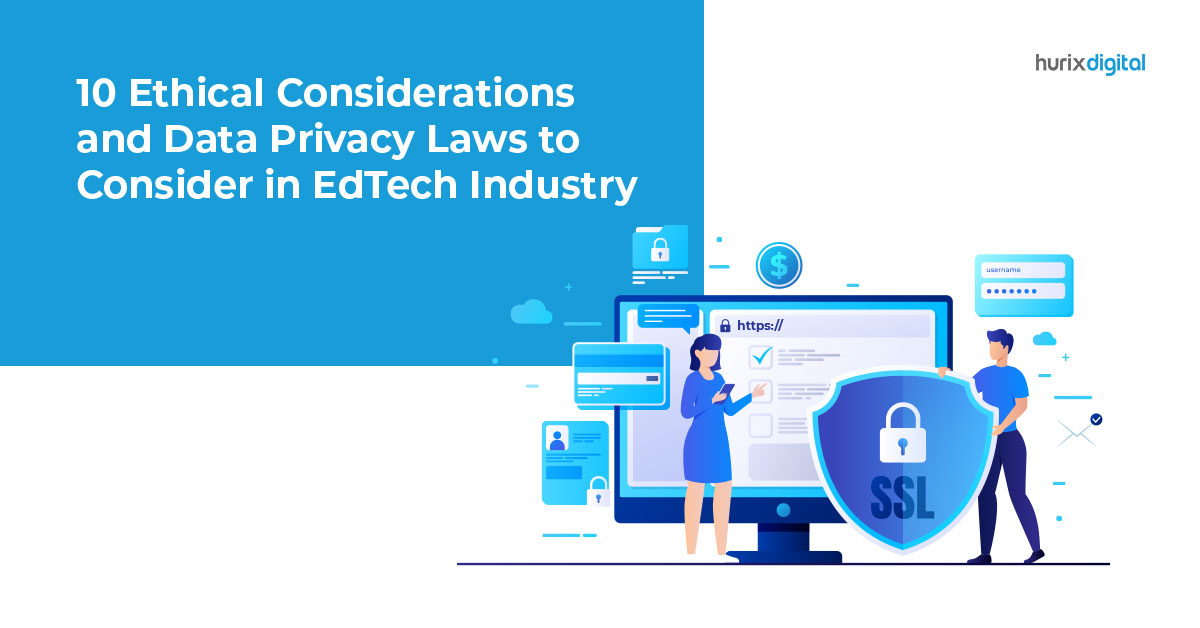10 Ethical Considerations and Data Privacy Laws to Consider in EdTech Industry
Table of Contents:
- Introduction
- Top 10 Ethical Considerations and Privacy Regulations:
1. Detailed Guidelines for Parents and Guardians
2. Compliance with Legal Obligations
3. Due Diligence for Third-Party Integrations
4. Data Breach Response Plan
5. Transparent Privacy Policies and Terms of Use
6. Data Retention and Disposal Plan
7. Anonymity and De-Identification
8. Teacher Training and Involvement
9. Age Verification
10. Cyberbullying and Harassment - Closing Thoughts
Introduction
The EdTech industry can be rightly credited for revolutionizing the process of learning but at what cost? At the expense of unsolicited student/user data collection and distribution.
for instance, in January 2020, Unacademy, one of India’s leading EdTech companies, suffered from a security breach. The cybersecurity attack led to the exposure of more than 20 million accounts. Consequently, stringent data privacy laws and ethical operational protocols should be a primary priority for all EdTech industry platforms.
If you are in the EdTech industry and looking for ways to manage your data security efficiently, you are in the right place.
Top 10 Ethical Considerations and Privacy Regulations
1. Detailed Guidelines for Parents and Guardians
Parents and guardians might or might not understand the importance of student data protection. Therefore, you must promote data protection literacy and provide them with detailed guidelines.
The guidelines will ensure they are knowing how their child’s data will be collected and protected by the EdTech company. Additionally, it will also encourage them to use privacy-protected devices and tools at home to prevent data breaches and misuse.
Also Read: Why Curriculum Integration Should be a Priority In Education
2. Compliance with Legal Obligations
Complying with legal obligations will ensure that the student data is protected and handled with utmost safety. Here are some legal obligations various countries follow to protect user privacy:
- General Data Protection Regulation (GDPR) – for data protection in European Economic Areas.
- Family Educational Rights and Privacy Act (FERPA) – for data protection and student education record security in the USA.
- Personal Information Protection and Electronic Documents Act (PIPEDA) – for citizens’ rights over their personal information and data collection by businesses, including EdTech companies in Canada.
- Personal Data Protection Bill (PDPB) – for personal data regulation and protection in India.
- Personal Data Protection Act (PDPA) – for data protection laws regulation data collection and use in Singapore.
3. Due Diligence for Third-Party Integrations
EdTech platforms often integrate with third-party services to enhance their functionalities and provide a more well-rounded experience to learners.
You must conduct due diligence before the integration and ensure the third-party service is following strict data privacy measures and complying with all legal and privacy regulations.
4. Data Breach Response Plan
EdTech platforms must proactively prepare for data breaches to respond effectively and protect the sensitive information of their users.
A data breach does not only compromise your customer trust and royalty but also damages the reputation of the platform along with an extensive financial loss. Therefore, a data breach response plan can help you minimize the damage and maintain the trust of all the stakeholders involved.
5. Transparent Privacy Policies and Terms of Use
Transparent privacy policies and terms of use ensure informed consent on the part of students, parents, guardians, and educators.
Transparent and well-drafted policies allow all stakeholders to indulge in informed decision-making. The users can individually assess whether the EdTech platforms meet their privacy preferences and make choices appropriately.
6. Data Retention and Disposal Plan
A streamlined data retention and disposal plan will ensure that you do not hold sensitive information for longer than required.
Follow a data lifecycle to collect, store, and use the data for the stipulated time and ensure compliance with student data protection regulations. Additionally, efficient data management also proves to be environmentally sustainable by reducing the energy consumption of data centers.
7. Anonymity and De-Identification
De-identification systems convert personal information into unidentifiable information which cannot be traced back to an individual. Approximately 328.77 million terabytes of digital data are produced per day.
Therefore, in this vast information database, anonymity systems ensure students’ privacy is always protected from unauthorized parties and platforms. with de-identification protocols in place, it would also be easier to fight data breaches, avoid information misuse, and protect sensitive information.
8. Teacher Training and Involvement
If you want to ensure the data privacy and protection of your students, you must train your teachers accordingly. They are the primary users of the platform, hence, responsible for entering and accessing sensitive information.
without proper awareness and training, teachers might fail to understand the importance of safeguarding student information. Teachers must be trained on important elements of data privacy and protection, like data encryption, password strength, multi-factor authentication, role-based access permissions, age restrictions, etc.
Also Read: Empowering K12 Teachers: Using Educational Video Games in the Classroom
9. Age Verification
Age verification allows EdTech companies to customize the content and digital learning requirement keeping in mind the age appropriateness of the learner.
for example, the USA follows the Children’s Online Privacy Protection Act (COPPA) which is tailor-made for children up to 13 years old. Additionally, age verification also helps with implementing proper data security protocols and enhancing the overall security of the platform.
10. Cyberbullying and Harassment
EdTech platforms should thoroughly follow strict cyberbullying and harassment protocols to ensure data protection along with a safe and secure learning environment for all.
In today’s digital age with robust technological apparatuses, young users often become victims of harmful behavior which can compromise their safety and privacy. To foster a safe learning space for all, you can organize regular seminars and educational sessions regarding the importance of a responsible digital learning environment.
Closing Thoughts
By adhering to strict data security and privacy protocols, EdTech companies can foster a safe digital learning space for all. With the continual evolution in the digital landscape, eLearning solutions will become more intertwined with student learning and growth.
Therefore, it is highly recommended that EdTech companies ensure the eLearning space is safe for all students.
If you need help with the same, you can reach out to us Hurix Digital. We can fulfill all your student data protection needs with our advanced digital services. We also provide a variety of other services like digital content transformation, robotic process automation, K-12 content solutions, and much more. Some of our trusted clients are Ikea, Cambridge University Press, Deloitte, etc. You can be our next trusted customer.
Contact our expert team now and get started. Hope to see you soon!

Senior Vice President – Business Development
Over 25 years of experience in the edtech and workforce learning industry with strong skills in Business Development, Customer Relationship Management (CRM) and Strategy.









